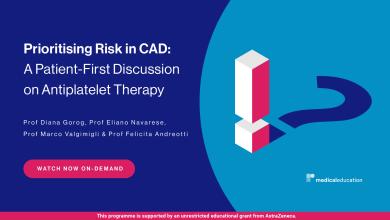Search results
Author(s):
Patrick Wong
,
Umair Shafique
Added:
3 years ago
Cardiovascular (CV) events are a major cause of mortality worldwide1 that are often precipitated by acute coronary syndromes (ACS). ACS result from the acute obstruction of coronary arteries and are defined as either unstable angina (UA) or myocardial infarction (MI), with or without ST-segment-elevation (STEMI and NSTEMI, respectively). Patients with moderate- to high-risk ACS are managed by an…
View more
Author(s):
Franz-Josef Neumann
Added:
3 years ago
Acute coronary syndromes (ACS) have been associated with the occurrence of cardiovascular (CV) events. Moderate- to high-risk ACS are generally managed by an early invasive approach, where coronary angiography is followed by percutaneous coronary intervention (PCI) or coronary artery bypass grafting (CABG). However, ACS and the use of PCI or CABG are associated with a high risk of thrombotic…
View more
Author(s):
Sasha Koul
,
David Erlinge
Added:
3 years ago
Acute coronary syndromes (ACS) are a major reason for death and morbidity in the industrialised world. One of the most successful treatments for ACS has been strategies to target the platelets and inhibit their function.
Mechanisms of Platelet Activation
Thrombus formation in the arteries is dependent on platelets and their ability to attach to the injured wall despite the rapid arterial blood…
View more
Author(s):
Kerry Layne
,
Albert Ferro
Added:
3 years ago
Acute coronary syndrome (ACS) is a term used to encompass unstable angina (UA) and myocardial infarction (MI) with or without electrocardiographic (ECG) evidence of ST-segment elevation. Antiplatelet therapy has formed the backbone of ACS management for decades and the drug class continues to evolve as novel agents with increasingly efficacious antiplatelet actions are identified. The main risk…
View more
Author(s):
Laurent Bonello
Added:
3 years ago
Clopidogrel is a key antiplatelet agent that inhibits the second step of platelet aggregation through blockade of the P2Y12-adenosine diphosphate (ADP) receptor.1 Its use has enabled percutaneous coronary intervention (PCI) to expand by dramatically reducing thrombotic complications in acute coronary syndromes (ACSs).2,3 Since the first report by Jaremo et al. of a large inter-individual…
View more
Prioritising Risk in CAD: A Patient-First Discussion
Video Series
Author(s):
Felicita Andreotti
,
Diana Gorog
,
Marco Valgimigli
,
et al
Start date:
Dec 14, 2023
View more
Author(s):
Paul A Gurbel
,
David Kandzari
Added:
3 years ago
The rare but catastrophic occurrence of stent thrombosis, in particular 'late' stent thrombosis, in association with deployment of drug-eluting stents has focused attention on the adequacy of the current dual anti-platelet regimen of aspirin and clopidogrel. Stent thrombosis is due to multiple factors. These include, specific stent features (delayed healing or polymer hypersensitivity),…
View more
Author(s):
Doreen Su-Yin Tan
Added:
3 years ago
Ischaemic heart diseases (IHD) – mainly MI – represent a large disease burden all over the world. Almost 18 million people die each year from cardiovascular diseases, accounting for 31 % of deaths globally.1 Ticagrelor, the more potent cousin of antiplatelet therapy clopidogrel, has been shown to reduce the composite endpoint of death from vascular causes, MI or stroke by an additional 16 %…
View more
Author(s):
Jean-Philippe Collet
,
Jochem Wouter van Werkum
Added:
3 years ago
Antiplatelet therapy is the standard of care for patients with acute coronary syndromes (ACS) and/or patients undergoing percutaneous coronary intervention (PCI) with stenting.1–3 Plaque rupture and/or iatrogenic vascular damage during PCI would normally result in the development of intravascular thrombus. Findings across multiple investigations consistently demonstrate the effectiveness of dual…
View more











